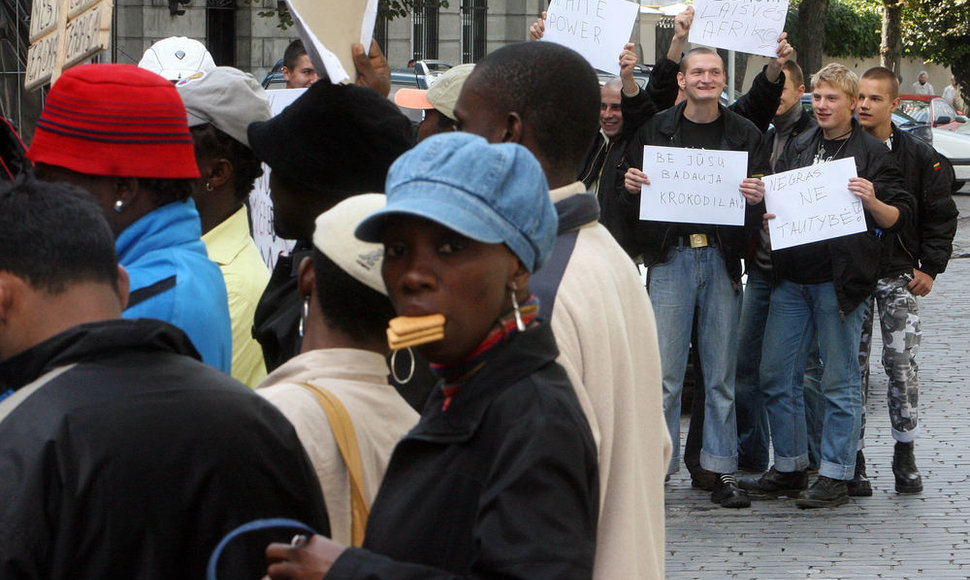The “failure of multiculturalism” in Western Europe mainly refers to newcomers from Islamic nations who allegedly failed to integrate into the life of their adopted countries; also to language barriers, unemployment, social security misuse, cultural differences. All this increases social marginalization, fuels mutual resentment, results in extremist positions. Lithuania is probably still to face the challenges of multicultural world, but the current discontent of its Polish-speaking citizens could be seen as an instance of unsuccessful integration.
Easy levelling
While Western Europe debates whether policies of multiculturalism failed or not, Lithuania is torn apart over the issue of Polish name spelling and language exam exemptions for national minority students. The streets of Vilnius sound with slogans to leave Lithuania for Lithuanians, even though it was Grand Duke Gediminas, the founder of the city, who famously invited foreign artisans and merchants to settle here, even offering tax exemptions. For centuries afterwards, Lithuanians lived peacefully side by side with Ruthenians, Germans, Tatars, Karaites, and Jews.
Dr. Gintautas Mažeikis, professor at Vytautas Magnus University in Kaunas, thinks it is good – for Lithuanians themselves if no one else – that Poles started voicing their grievances. Patriotic ideas, too, would be welcome – if multiculturalism existed in Lithuania. As things stand now, their slogans degenerate into putting one ethnic group atop all others and mechanical attempts to force everyone else be like it.
“Lithuanians only benefit from Lithuania's Poles having started insisting on their problems,” the professor of philosophy and cultural theory tells 15min. “This diminishes the one-dimensionality of Lithuanians, we can see differences, reflect on our culture in relation to another ethnic group, revisit our history and cultural heritage.”
It is regrettable, Mažeikis says, that these issues are only raised in terms of ethnic relations – and not, for instance, religion. Both Lithuanians and Poles are Catholic – therefore, similar: “We classify our issues for the convenience of bureaucrats and this only encourages ethnic groups to close in on themselves, especially within traditionalist communities that Lithuanians and Poles are. There's no mention of other rights – as if it weren't a problem. Patriotic marches could take place, were there any trace of multiculturalist politics in Lithuania. In that case, groups representing the Lithuanian culture would have a place and look much better – there would be a dialogue.”
Mažeikis believes multiculturalism is a complex issue, encompassing national, religious, cultural differences, even those between classes and genders. Oftentimes, the “bureaucratic mentality” turns this doctrine into internationalism – reducing it to relations between different nations and religions.
According to the philosopher, individuals in such one-dimensional societies come to resemble one another. By contrast, countries like Sweden and Norway assist people in fostering their cultures – making differences appear but at the same time reconciling seemingly incompatible things, like women's rights and Islam.
“In a world dominated by bureaucratic mentality, the easiest method prevails – levelling, creating one-dimensional men, instead of allowing people to be members of their own sub-cultures. Diversity should be encouraged, while it gets erased. But this easy way only leads to bigger conflicts,” Mažeikis believes.
Cultural hybrid
British author, traveller, and documentary filmmaker Tahir Shah was a guest at this year's Vilnius Book Fair and saw variety in the Lithuanian society as a big advantage.
 |
| Tahir Shah |
“I can see many cultural and historical layers. Your society has depth. I go to places where there are sometimes no traces of movement, no diversity. Whereas you are a hybrid of cultures,” he told 15min.
Shah himself is a child of multiculturalism – he has Afghan, Indian, and Parsi heritage, he was born and raised in Great Britain, is married to an Indian and now lives in Morocco.
Commenting on words uttered by British Prime Minister David Cameron several years ago, that state multiculturalism has failed, Shah says he can understand extreme right-wingers. “English families can see that their street is populated by Pakistanis, that they ask for social security and try to get money from the government. Poor Englishmen are disappointed. I would be, too.”
He says he notices his native country becoming less English. “I walk the streets of London and do not hear the English language. I hear Hindu, Spanish, Lithuanian. It seems at times that England has lost its identity. In Morocco, identity is very strong, it is the core of the society. People respect the royal family. No one makes fun of their king. Englishmen do nothing but make jokes about the queen. You have a strong identity in Lithuania. Perhaps it takes a foreigner to notice that,” he says.
During his short stay, Shah has got an impression that Polish and Russian-speakers are not entirely integrated into the society dominated by Lithuanians: “You must do what is acceptable in the country. I wanted to wear shorts in Afghanistan, but that was indecent. Likewise, I think, it is unacceptable to wear burqas in Europe. You must belong to the place you live in. My father used to say: If you live in England, speak English better than everyone else. You can be different, but you must respect the place where you live.”
Europeans afraid of themselves?
Another guest at Vilnius Book Fair – Iranian author Kader Abdolah who has spent the last quarter-century in the Netherlands – believes that multiculturalism is merely a political term and only serves to mislabel.
 |
| Kader Abdolah |
People leave their countries with a cultural baggage, but once they settle somewhere else, they can successfully become part of another society within 20-30 years, even though some chose not to learn another language, they seek the company of their fellow countrymen and live in ghettoes.
The author refuses to call such people immigrants. In an open society like the US, the majority of people are newcomers or their descendants, while Europe sticks to its old-fashioned attitudes, it tries to impose the rules. Newcomers have a duty to accept the culture of their adopted country, but at the same time cherish their own, add a piece of it to the communal mosaic.
“It is dangerous for Europe to ask everyone to change, she will fall sick. Immigrants have to accept the rules, but they have to pass their language and traditions onto their children, so that it all mixes into the society,” Abdolah suggests.
What is it that makes locals resent newcomers – fear for their jobs, reluctance to accept foreign cultures? Rejection is a very human reaction, Abdolah believes, but what Europeans fear most are themselves.
“Europe is tormented by problems that will fall with full might in 200 years. She is ageing, Europeans – Lithuanians, Dutch – are decreasing in numbers. Over the next 50 years, hundreds of thousands of Africans and Asians will come, they'll inject some new blood and Europe will be strong again. Immigration does not happen because someone wants to come, it happens where there's a need for people,” he says.
Lithuanians resentful of foreigners?
According to polls, more people in Lithuania think that the state should pay greater attention to integrating immigrants (language courses, children's education) and fewer think that newcomers are an asset to the economy.
Last year, the Ethnic Research Institute carried out a survey, where 7 out of 10 respondents said they would be willing to let foreigner in, provided there were enough jobs for them, while one fourth would ban economic immigration. 6 out of 10 said they would not like to see newcomers from Africa, almost as many felt hostile towards the Chinese. About a half say they object to immigration from Turkey, Kazakhstan, and Caucasus.
According to the Residents' Register Service, the number of immigrants residing in Lithuania diminished over the last several years. In 2009, they numbered around 28.5 thousand, while in 2011, fewer than 26.6 thousand.













